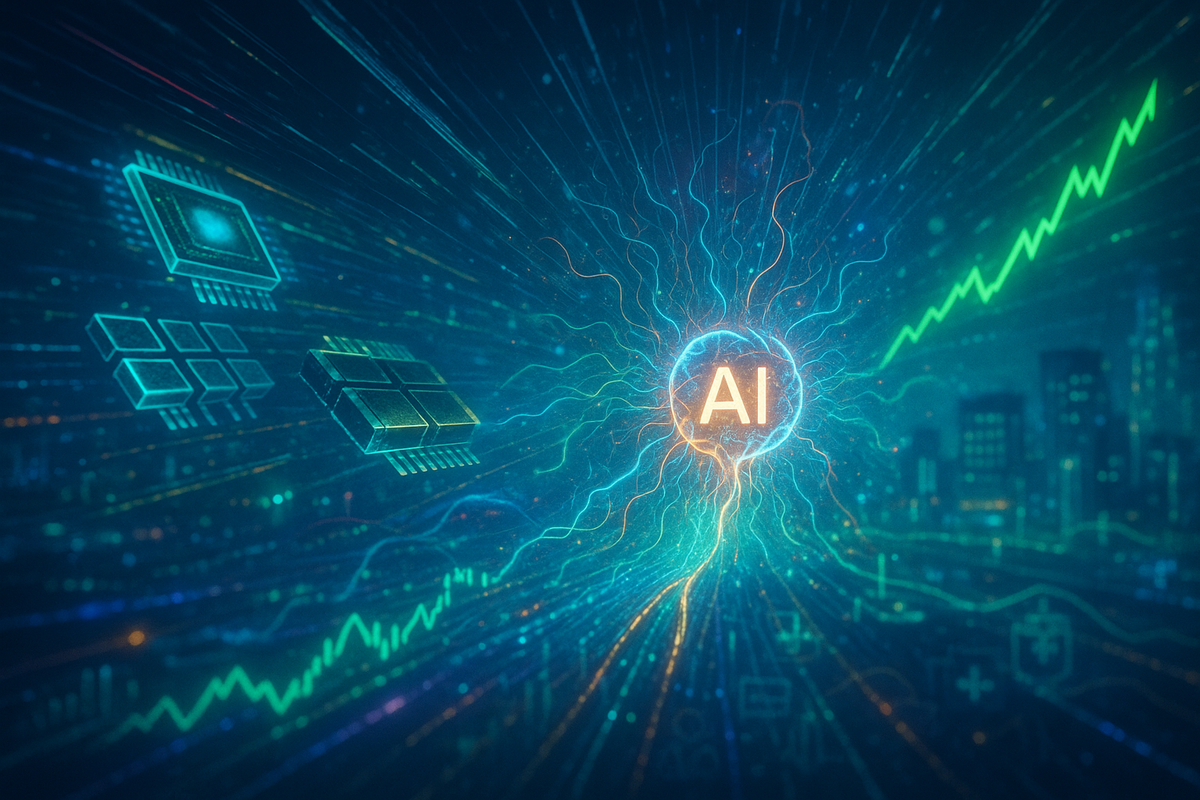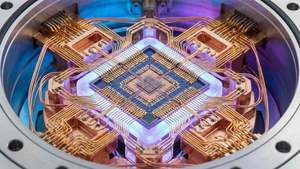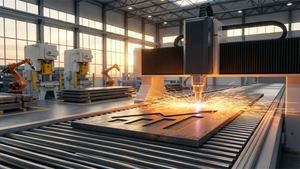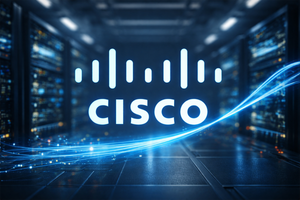
The world is in the midst of an unprecedented technological revolution, driven by the relentless surge of artificial intelligence. Companies like Nvidia (NASDAQ: NVDA) and OpenAI are not merely innovating; they are spearheading a transformation that is propelling the technology sector to historic highs and promising to redefine industries across the globe. This AI avalanche, fueled by staggering investments and rapid advancements, signals a new era of productivity and market expansion, yet it also presents a complex landscape of winners, losers, and profound societal implications.
The Unfolding AI Phenomenon and Its Global Significance
The current AI surge is characterized by an exponential growth trajectory, with the global AI market, valued at approximately $391 billion in 2025, projected to soar to an astonishing $1.81 trillion by 2030. This remarkable compound annual growth rate (CAGR) of 35.9% signifies a pace of innovation and adoption that rivals, if not surpasses, previous technological booms like cloud computing and the mobile app economy. At its core, AI is evolving from a mere technological enhancement to a central pillar of business strategy, driving efficiencies, enabling predictive analytics, and crafting personalized experiences across diverse sectors. This shift represents a fundamental "technological re-architecture" of industries, positioning AI as a dominant frontier technology poised to augment human capabilities and redefine established business models.
The insatiable demand for specialized hardware crucial for AI applications has propelled Nvidia (NASDAQ: NVDA) to the forefront. As a leading designer of graphics processing units (GPUs) and AI chips, Nvidia's H100 GPU has become indispensable for AI workloads, contributing to the company's meteoric rise in market value. Its innovations are not only bolstering its profitability but are also powering the generative AI boom, influencing everything from cloud computing infrastructure to advanced industrial applications. With an estimated 70% to 95% market share in AI accelerators, solidified by its flagship GPUs and the industry-standard CUDA software, Nvidia's dominance is undeniable.
Parallel to Nvidia's hardware prowess, OpenAI, a pioneering AI research lab, has profoundly impacted the modern AI landscape with its powerful tools like GPT-3 and ChatGPT. Its rapid ascent and widespread adoption are considered among the most explosive for any technology product to date. OpenAI's strategic partnerships are equally significant; its integration of ChatGPT into iOS 18 provides unparalleled access to the consumer market, while its deep collaboration with Microsoft (NASDAQ: MSFT) embeds OpenAI's technology into products like Azure OpenAI Services and Copilot in Microsoft Office. A recent announcement detailing a plan to partner with Nvidia to invest up to $100 billion in building next-generation AI infrastructure, with Nvidia supplying millions of GPUs, further underscores the symbiotic relationship between these two giants and their collective impact on the future of AI.
The Market's AI-Driven Ascent and Potential Shifting Tides
The AI surge is underpinned by colossal investments, acting as a powerful catalyst for the technology sector and the broader stock market. In 2024, corporate AI investment reached $252.3 billion, with private investment climbing 44.5% from the previous year. Generative AI alone attracted $33.9 billion, an 18.7% increase from 2023. Global venture capital funding for AI companies exceeded $100 billion in 2024, an 80% increase from 2023, firmly establishing AI as the leading sector for investments. The United States leads globally in private AI investment, with a staggering $109.1 billion in 2024, with major tech players like Amazon (NASDAQ: AMZN), Google (NASDAQ: GOOGL), Microsoft (NASDAQ: MSFT), Nvidia (NASDAQ: NVDA), and Salesforce (NYSE: CRM) among the top investors in AI startups.
These unprecedented investments are directly fueling a significant rally in the stock market. Indices such as the Nasdaq and S&P 500, alongside individual stocks like Nvidia (NASDAQ: NVDA), have hit record highs, with the technology sector's substantial weighting in market-cap-weighted indices largely driving the overall market's upward trajectory. Investor optimism surrounding AI's potential to redefine industries, unlock new levels of productivity, and generate substantial profits is a key factor. However, this bullish sentiment is tempered by caution from some financial analysts who draw parallels to the dot-com era, warning that the current boom, characterized by intense capital expenditure and cash-burning AI startups, could be creating a bubble. Concerns include lower growth, higher competition, and greater capital intensity within the tech sector compared to previous booms.
The impact on companies is starkly divided into potential winners and those facing significant challenges. Winners are predominantly those at the forefront of AI development and adoption:
- Nvidia (NASDAQ: NVDA): As the dominant supplier of AI chips, its hardware is the backbone of the AI revolution.
- OpenAI and its strategic partners (Microsoft (NASDAQ: MSFT)): Pioneers in generative AI, their models are driving widespread adoption and new product integrations.
- Hyperscale Cloud Providers (Microsoft (NASDAQ: MSFT), Google (NASDAQ: GOOGL), Amazon (NASDAQ: AMZN)): These companies are heavily investing in AI infrastructure and offering AI-as-a-service, becoming critical enablers for other businesses.
- Software and SaaS companies integrating AI: Firms leveraging AI to enhance their offerings, improve efficiency, and create new features will see increased demand and market share.
- Industries adopting AI for productivity gains: Healthcare, finance, manufacturing, and retail companies that successfully integrate AI for automation, analytics, and personalized experiences stand to gain significant competitive advantages and market value.
Conversely, potential losers include companies that fail to adapt or invest in AI:
- Legacy industries slow to adopt AI: Businesses that do not integrate AI into their operations risk being outmaneuvered by more agile, AI-powered competitors, leading to reduced market share and profitability.
- Companies reliant on traditional processes: Those that cannot automate or optimize their workflows with AI may face higher operational costs and lower efficiency.
- Hardware providers not specializing in AI: Companies producing generic hardware or components without a focus on AI-specific demands may see their market relevance diminish.
- Businesses with high labor costs in easily automatable tasks: AI-driven automation could significantly disrupt sectors with repetitive or predictable tasks, potentially leading to job displacement and pressure on companies to reskill their workforce.
Broader Implications: A Paradigm Shift Across Industries
The ripple effects of the AI surge extend far beyond the tech sector, instigating a paradigm shift across a diverse array of industries. In healthcare and pharmaceuticals, AI is revolutionizing patient care, accelerating drug discovery, and enhancing diagnostics by reducing human error, streamlining processes, and analyzing vast datasets with unprecedented speed. For retail, AI is transforming customer experiences through personalized recommendations, optimizing inventory management, and refining supply chain operations with predictive analytics and automation. The automotive sector is witnessing breakthroughs in autonomous technology, led by companies like Tesla (NASDAQ: TSLA) and Nvidia (NASDAQ: NVDA), with the self-driving vehicle market projected to reach $65.3 billion by 2027, enhancing safety features and navigation systems.
The finance and banking industry is leveraging AI for sophisticated data analytics, fraud detection, and personalized financial advice, unlocking significant market value. In manufacturing and supply chain, AI integration is improving efficiency, reducing costs, and optimizing decision-making, leading to potential increases in profit margins. Furthermore, AI is making substantial inroads into cybersecurity, gaming, education, and various enterprise operations such as marketing and sales, software engineering, and research and development. This widespread adoption underscores AI's role as a foundational technology, much like electricity or the internet, with the potential to fundamentally alter how every industry operates, competes, and creates value. The competitive landscape is being redrawn, favoring agile innovators and penalizing those resistant to change.
From a regulatory and policy perspective, the rapid advancement of AI is prompting governments worldwide to consider frameworks for ethical AI development, data privacy, and algorithmic transparency. The potential for job displacement due to automation is also a growing concern, necessitating discussions around workforce reskilling and social safety nets. Historically, such transformative technological shifts have often been accompanied by periods of economic disruption and societal adaptation, drawing comparisons to the industrial revolution or the internet boom. While the immediate focus is on economic growth and innovation, the long-term implications for labor markets, ethical governance, and global competitiveness are profound and will require careful navigation by policymakers and industry leaders alike.
What Comes Next: Navigating the AI Frontier
As the AI frontier continues to expand, both short-term and long-term possibilities abound. In the short term, we can expect to see an acceleration in the development of more sophisticated AI models, enhanced integration of AI into everyday applications and services, and a continued surge in venture capital funding for promising AI startups. Companies will likely prioritize strategic pivots to embed AI capabilities deeply into their core operations, seeking immediate gains in efficiency and competitive advantage. The market will continue to reward companies demonstrating clear pathways to AI-driven revenue growth and cost reduction.
Looking long term, the implications are even more transformative. We can anticipate the emergence of entirely new industries and business models powered by advanced AI, fundamentally altering the economic landscape. The potential for AI to solve complex global challenges in areas like climate change, healthcare, and sustainable development will become increasingly apparent. However, this future also presents significant challenges, including the need for robust regulatory frameworks to address ethical concerns, data privacy, and the responsible deployment of autonomous systems. Market opportunities will arise for companies specializing in AI governance, security, and specialized AI training and consulting services.
Potential scenarios range from a continued, steady growth in AI adoption leading to sustained economic expansion, to more volatile periods marked by intense competition, technological breakthroughs, and perhaps even regulatory interventions that could reshape market dynamics. Investors should closely monitor key indicators such as AI investment trends, the development of next-generation AI hardware and software, the regulatory landscape, and the rate of AI adoption across diverse industries. The ability of companies to adapt, innovate, and strategically integrate AI will be paramount to their success in the coming months and years.
The Enduring Impact of the AI Revolution
The current surge in artificial intelligence, spearheaded by industry titans like Nvidia (NASDAQ: NVDA) and OpenAI, represents a pivotal moment in technological history. The key takeaways from this ongoing revolution are clear: AI is not merely a trend but a foundational technology driving unprecedented growth, investment, and innovation across the global economy. Its profound impact is evident in the record-breaking valuations of tech companies, the massive influx of capital into AI startups, and the widespread adoption of AI solutions across diverse industries, from healthcare to finance and manufacturing.
Moving forward, the market will continue to be heavily influenced by advancements in AI. Companies that strategically invest in AI research, development, and integration will likely emerge as leaders, leveraging AI for enhanced productivity, new product development, and superior customer experiences. Conversely, those that fail to adapt risk obsolescence in an increasingly AI-driven world. The potential for increased market value from widespread AI adoption is immense, with projections suggesting trillions of dollars in economic benefit and significant boosts to market capitalization.
Investors should closely watch several key factors in the coming months. These include continued innovation in AI hardware and software, the expansion of AI into new industry verticals, the development of ethical AI frameworks and regulations, and the competitive landscape as more players vie for market share. The symbiotic relationship between hardware providers like Nvidia (NASDAQ: NVDA) and AI model developers like OpenAI will be crucial to monitor, as their collaborations will continue to shape the trajectory of AI capabilities. Ultimately, the AI revolution is set to leave an indelible mark on the global economy, promising a future defined by intelligent automation, unprecedented efficiency, and transformative possibilities.





